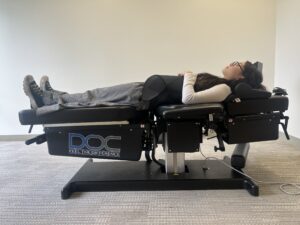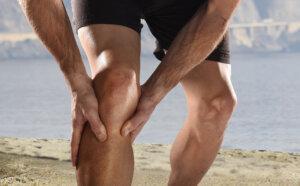Peripheral neuropathy is a condition that affects the nerves outside of the brain and spinal cord, leading to a range of symptoms that can impact your quality of life. At TruSpine Chiropractic, our team of expert chiropractors and wellness providers are dedicated to helping patients in San Francisco manage the symptoms of peripheral neuropathy through integrative care.
In this article, we’ll explore the common signs and symptoms of peripheral neuropathy and discuss how chiropractic care, acupuncture, and other innovative therapies can provide relief.

Key Takeaways
- Peripheral neuropathy can cause symptoms like numbness, tingling, burning, and weakness in the hands and feet
- Symptoms vary depending on the type of nerves affected – sensory, motor, or autonomic
- Risk factors include diabetes, vitamin deficiencies, autoimmune disorders, and certain medications
- Chiropractic adjustments, acupuncture, and therapies like laser and shockwave can help manage neuropathy symptoms
- Making lifestyle changes and treating underlying conditions are also important for neuropathy care
Additional reading: Nerve Pain: Your Body’s Alarm System
Symptoms of Peripheral Neuropathy
Peripheral neuropathy refers to damage or dysfunction of the peripheral nerves – the nerves that transmit messages between the brain, spinal cord, and the rest of the body. When these nerves are damaged, it can lead to a variety of symptoms that typically start gradually and worsen over time.
Identifying the signs of peripheral neuropathy early allows for prompt treatment to manage symptoms and prevent further nerve damage.
The symptoms of peripheral neuropathy can vary depending on the type of nerves that are affected. There are three main types of peripheral nerves:
- Sensory nerves: These nerves receive sensation, like temperature, pain, vibration or touch, from the skin.
- Motor nerves: These nerves control muscle movement.
- Autonomic nerves: These nerves control functions like blood pressure, heart rate, digestion, and bladder.
Here are some of the most common symptoms of peripheral neuropathy, categorized by the type of nerves involved:
Sensory Neuropathy Symptoms
| Symptom | Description |
|---|---|
| Numbness or tingling | You may experience a feeling of numbness, tingling, or “pins and needles” in your hands or feet that gradually spreads upward into your legs and arms. |
| Burning pain | Some people with neuropathy describe a burning, sharp, or electric-like pain, especially in the evening. |
| Sensitivity | You may experience increased sensitivity to touch or temperature changes. |
| Reduced sensation | On the opposite end of the spectrum, you may feel reduced sensitivity to temperature or touch. |
Motor Neuropathy Symptoms
| Symptom | Description |
|---|---|
| Muscle weakness | motor neuropathy can cause weakness in the muscles controlled by the affected nerves, leading to difficulty with coordination and balance |
| Muscle cramps or twitching | Damage to the motor nerves can also cause muscle cramps, twitching, or even muscle atrophy over time |
| Paralysis | In severe cases, you may experience paralysis in certain muscles |
Autonomic Neuropathy Symptoms
| Symptom | Description |
|---|---|
| Digestive issues | Autonomic neuropathy can lead to symptoms like bloating, nausea, constipation, or diarrhea |
| Bladder problems | You may experience incontinence, difficulty emptying your bladder, or urinary tract infections |
| Sweating | Damage to the autonomic nerves can cause excessive sweating or an inability to sweat |
| Dizziness | You may feel dizzy or lightheaded due to changes in blood pressure |
It’s important to note that not everyone with peripheral neuropathy will experience all of these symptoms. The severity and type of symptoms can vary from person to person.
If you are experiencing any of the above symptoms, it’s important to talk to your doctor or a qualified healthcare provider, like the team at TruSpine, to determine the underlying cause and develop an appropriate treatment plan.
Risk Factors for Peripheral Neuropathy
There are several risk factors that can increase your chances of developing peripheral neuropathy, including:
- Diabetes: This is the most common cause of peripheral neuropathy. High blood sugar levels can damage the nerves over time.
- Vitamin deficiencies: B vitamins, especially B-12, are important for nerve health. Deficiencies can lead to neuropathy.
- Autoimmune disorders: Conditions like rheumatoid arthritis, lupus, and Guillain-Barre syndrome can cause neuropathy.
- Infections: Certain viral or bacterial infections like shingles, Epstein-Barr virus, hepatitis C, leprosy, diphtheria, and HIV can cause neuropathy.
- Toxins: Exposure to heavy metals, industrial chemicals, and certain medications (especially chemotherapy drugs) can damage the nerves.
- Alcoholism: Poor dietary habits and nutrient deficiencies associated with alcoholism can lead to nerve damage.
- Inherited disorders: Some people have a family history of neuropathy due to inherited genetic mutations.
Understanding your risk factors can help with prevention and early detection of peripheral neuropathy. At TruSpine, we take a comprehensive approach to evaluating each patient’s unique risk factors and developing personalized care plans.
How Chiropractic Care Can Help With Peripheral Neuropathy
Chiropractic care is a drug-free, non-invasive treatment option that can help manage the symptoms of peripheral neuropathy. Chiropractors, like the experienced providers at TruSpine, focus on identifying and treating misalignments in the spine and other joints that may be contributing to nerve dysfunction.
Chiropractic Adjustments for Neuropathy
Chiropractic adjustments involve gentle, targeted manipulations to the spine and other joints to improve alignment, reduce inflammation, and take pressure off of compressed nerves. By restoring proper alignment and function to the musculoskeletal system, chiropractic adjustments can help reduce pain, numbness, and other neuropathy symptoms.
Acupuncture for Neuropathy
Acupuncture is another therapy offered at TruSpine that can be beneficial for peripheral neuropathy. This traditional Chinese medicine technique involves the insertion of thin needles into specific points on the body to stimulate healing and reduce pain. Research has shown that acupuncture can help improve nerve function, reduce inflammation, and provide pain relief for people with neuropathy.
Other Therapies for Neuropathy
In addition to chiropractic adjustments and acupuncture, the team at TruSpine offers several other innovative therapies that can help manage neuropathy symptoms:
- Cold laser therapy: This non-invasive treatment uses low-level lasers to stimulate cellular healing and reduce pain and inflammation.
- Shockwave therapy: This therapy uses high-energy sound waves to stimulate tissue healing, reduce pain, and improve circulation.
- Ultrasound therapy: This treatment uses sound waves to create deep heat therapy, which can help reduce pain, stiffness, and muscle spasms.
Your chiropractor will work with you to determine which combination of therapies is best suited for your individual needs and symptoms.
Lifestyle Changes for Managing Peripheral Neuropathy
In addition to seeking chiropractic care and other therapies, there are several lifestyle changes you can make to help manage the symptoms of peripheral neuropathy:
- Manage underlying conditions: If you have diabetes, autoimmune disorders, or other conditions that increase your risk of neuropathy, work with your healthcare provider to manage those conditions through medication, diet, and lifestyle changes.
- Eat a healthy diet: Eating a balanced diet rich in B vitamins, antioxidants, and anti-inflammatory foods may help support nerve health. Avoid excessive alcohol intake.
- Exercise regularly: Engage in low-impact exercises like walking, swimming, or cycling to improve circulation, maintain muscle strength, and control blood sugar levels. Yoga and tai chi can also help with balance and flexibility.
- Practice good foot care: If you have neuropathy in your feet, it’s important to check your feet daily for cuts, blisters, or sores. Always wear well-fitting, supportive shoes and soft, seamless socks.
- Manage stress: Chronic stress can worsen pain and other neuropathy symptoms. Practice stress-management techniques like deep breathing, meditation, or gentle exercise.
- Quit smoking: Cigarette smoking can constrict blood vessels and worsen neuropathy symptoms. If you smoke, talk to your doctor about smoking cessation programs.
Making these lifestyle changes, in combination with regular chiropractic care and other therapies, can help you effectively manage peripheral neuropathy symptoms and improve your overall quality of life. The team at TruSpine is here to support you every step of the way.
When to Seek Medical Care
If you are experiencing symptoms of peripheral neuropathy, it’s important to see a healthcare provider for an accurate diagnosis and appropriate treatment plan. Early intervention can help prevent further nerve damage and manage symptoms effectively.
Seek immediate medical care if you experience any of the following symptoms:
- Severe, sudden onset of pain or weakness
- Numbness or tingling that spreads rapidly
- Difficulty breathing or swallowing
- Changes in vision or hearing
- Loss of bladder or bowel control
These symptoms could indicate a more serious underlying condition that requires prompt medical attention.
Conclusion
Peripheral neuropathy can cause a range of symptoms that impact your daily life, but there are effective treatment options available. Chiropractic care, acupuncture, and other innovative therapies offered at TruSpine Chiropractic can help manage pain, improve nerve function, and enhance your overall well-being.
If you’re in the San Francisco area and are experiencing symptoms of peripheral neuropathy, the expert team at TruSpine is here to help. Contact us today to schedule a consultation and take the first step towards finding relief from your neuropathy symptoms. Together, we’ll create a personalized care plan to help you live your best life, free from pain and discomfort.




